#how to sell product on amazon
Explore tagged Tumblr posts
Text







http://www.otoecomm.com
#ecommerce blog#how to became online seller#how to grow orders#amazon#amazon fba#online sellers#oto ecommerce#otoecomm#ecommerce online courses#ecommerce services#ecommerce solutions#how to sell product on amazon#amazon training#amazonfba#amazonseller#amazon online course#etsyseller#meesho
1 note
·
View note
Text
How To Earn Money From Amazon?
Amazon product sales can be an excellent way to reach a large audience and grow your business. The steps you need to take are as follows to start selling on Amazon:
Create an Amazon seller account: Go to Amazon Services and create an account. You will need to provide your business information, tax identification number, and a payment method for Amazon fees.
Choose a selling plan: Amazon offers two selling plans, the Individual and Professional plans. The Individual plan has no monthly fee but a higher per-item
Read More:
#Amazon#Amazon earning#earn from amazon#How to Earn from amazon#How to sell product on amazon#amazon store
0 notes
Text
idk who needs to hear this but period underwear is a godsend and if you can access and afford it, you should get some. it's way more comfortable and less nasty to deal with than disposable products
#ive been wearing thinx for about a year now#and this one brand i got a five-pack off amazon from called neione(?) for lighter days that can pair w other products if needed#it depends on ur flow and what u get. right? it's annoying to look around and see how many brands on amazon#are like. not actually meant to be worn by themselves to bleed freely in#i don't currently own enough pairs that i never use disposable products at all anymore#but i usually only do like. one day out of my cycle on average#and that day im always like 'ew gross'#it's much more comfortable not to have to worry about it not to mention better for the environment#if u live in the us then they sell thinx at target and ive seen them at cvs too#if u dont wanna buy online#anyway im just sayin!#if uve been thinking about taking the dive and buying period underwear this is your sign#tales from diana#menstruation cw#the only annoying thing is that a lot of brands also cant go into the dryer (including thinx) (that was one of the reasons i got neione)#anyway it's great. i would never switch back to only using disposable products#and im far too much of a wuss to try cups. like far far too much#i just ordered a heavy-flow two-pack from a brand i havent tried before (tiichoo) and theyre boyshorts#bc one of the most annoying things about the heavy-flow thinx isnt that it doesnt absorb enough#but if u sleep in them. depending on your position and gravity. they can still leak (in the bikini cut)#hoping that a boyshort cut will solve that problem#<3
4 notes
·
View notes
Text


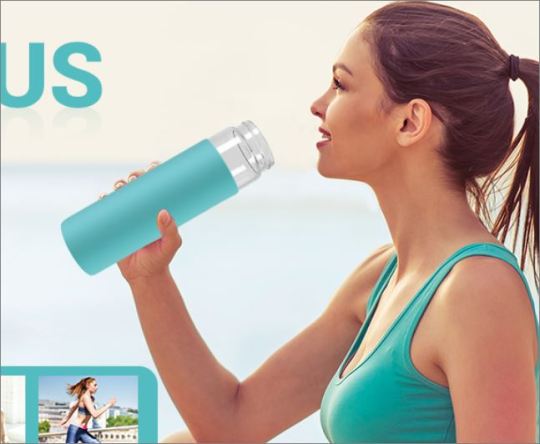


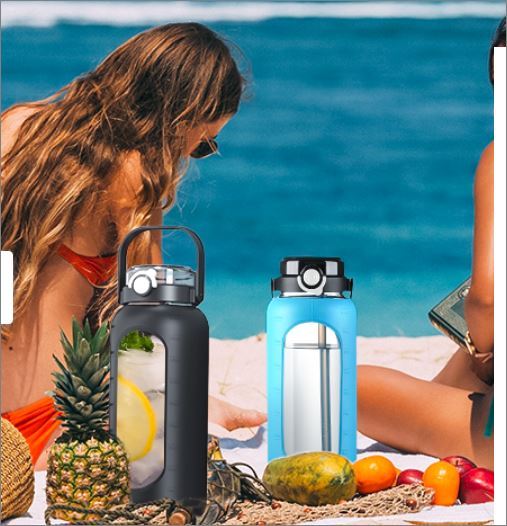
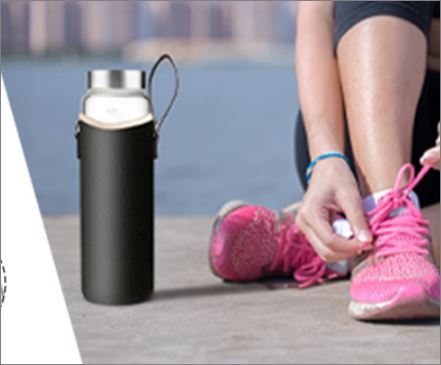


I love all of these goofy product photos where the water bottle is extremely obviously just photoshopped onto a stock image of someone pretending to hold something or whatever.. very convincing..
#the last one where the water bottle is like nearly the size of the woman's entire leg ghbjbjhh#ALSO I know.. gross.. nasty.. amazon.. I was only looking there because I was trying to find an exact replica of an old water bottle#I bought like 6 years ago in a store and I just wanted another one of those and it seemed like the only place the old manufacturer#still sold was through amazon but.. alas.. I think they just don't make them anymore. so I have abandoned my hunt#I didn't actually buy anything. but I did get distracted clicking through product images for a few of them#it's bizarre how like............... idk.. WHY is this done??? Isn't this offputting to basically ANY potential customer?? or do people#not look at every photo/read the entire page/all product information before buying??#all of these are from like front page ''top sellers'' or whatever like........... how does this not hurt the brand????#If the company can't even bother to take a single photo of a real life person using their real life product then... that to me#is kind of red flaggy..?? even if you're an indie start up small business with hardly any funds.. still#A real photo of the product you are selling in a real actual non-photo shopped environment does not seem that inacessible#Maybe it's because everyone does everything on phones now?? So it's harder to see the pictures when they're smaller?#Kind of the same thing with ai art and also hair color photoshops lol.. On my full comptuer screen it is SOOO easy to spot ai art#like IMMEDIATELy from the little tells and ways certain details morph into each other etc. I dont even mean obvious dalle mini stuff but#like the Fancy High Quality Photorealistic AI art is still pretty blatant 98% of the time if you know what to look for. But I still catch#people sharing it a lot like 'omg where can I buy this pair of shoes!! :O <3' .. erm you cannot.. that is the most balatantly fake looking#pair of shoes I have seen in my life hhjbj.. the heels are both different heights. there's a different number of straps on each one. etc.#AND that phase back before colored hair was Mainstream and people would post photos like 'omg going to bring this to the salon!! dream hair#and it's like.. you can LITERALLY see the parts where it's 'colored outside of the lines' and is so clearly just a person with blond hair#that someone drew over with a tint brush or something not even very neatly. etc. etc. ANYWAY.. Maybe with phones it's harder to tell these#things?? To me so much of it is instantly recognizable and it's suprising to me that people either don't notice or don't care and will#interact with it anyway by buying the product or acting like some ai art fake furniture is real or etc. etc. ..hewwoo#Aslo sidenote - I think I've become soo cynical and tired of constantly being advertised to that I literally cannot shop without getting#exhausted. I do not see how marketing is anything but obnoxious and transparent. Every item description having stuff like ''Our company is#commited to bringing you the highest quality water products! we set out with a mission to bring high quality products to people all over#the world and we believe in spreading health and happiness and'' just like SHUT THE HELL UP!! youre a fucking company#you don't ''beleive'' in anything you are here to sell a product. stop trying to talk like you're my bff who cares deeply about my health#or something just tell me the materials and product specifications of your stupid fucking water bottle and move on. Idont need to hear your#whole bullshit spiel about what ~your company stands for~ that is SO much MORE offputting. you make me want to buy the item LESS..#longing for the type of ads from my 1800s magazines that are just like 'this product is good. please buy it. okay thank you much. bye'
9 notes
·
View notes
Text
#**How to Earn Money Online**#Earning money online has become more accessible than ever. Popular methods include **freelancing** on platforms like Upwork or Fiverr#where skills like writing#design#or coding are in high demand. You can also explore **selling products** through e-commerce sites like Etsy or Amazon. If you prefer passive#try creating content for **blogs#YouTube**#or **affiliate marketing**#where you earn commissions by promoting products. Online surveys#virtual tutoring#and investing in cryptocurrencies are other options. Success requires consistency#skill-building#and choosing the right niche. With dedication#earning online can provide flexibility and financial freedom.
1 note
·
View note
Text
"Businesses like to talk about the concept of a closed loop or circular economy, but often they’re trying to close small loops. Releaf Paper takes dead leaves from city trees and turns them into paper for bags, office supplies, and more—which is to say they are striving to close one heck of a big loop.
How big? Six billion trees are cut down every year for paper products according to the WWF, producing everything from toilet paper to Amazon boxes to the latest best-selling novels. Meanwhile, the average city produces 8,000 metric tons of leaves every year which clog gutters and sewers, and have to be collected, composted, burned, or dumped in landfills.
In other words, huge supply and huge demand, but Releaf Paper is making cracking progress. They already produce 3 million paper carrier bags per year from 5,000 metric tons of leaves from their headquarters in Paris.
Joining forces with landscapers in sites across Europe, thousands of tonnes of leaves arrive at their facility where a low-water, zero-sulfur/chlorine production process sees the company create paper with much smaller water and carbon footprints...
“In a city, it’s a green waste that should be collected. Really, it’s a good solution because we are keeping the balance—we get fiber for making paper and return lignin as a semi-fertilizer for the cities to fertilize the gardens or the trees. So it’s like a win-win model,” [Valentyn] Frechka, co-founder and CTO of Releaf Paper, told Euronews.
Releaf is already selling products to LVMH, BNP Paribas, Logitech, Samsung, and various other big companies. In the coming years, Frechka and Sobolenka also plan to further increase their production capacity by opening more plants in other countries. If the process is cost-efficient, there’s no reason there shouldn’t be a paper mill of this kind in every city.
“We want to expand this idea all around the world. At the end, our vision is that the technology of making paper from fallen leaves should be accessible on all continents,” Sobolenka notes, according to ZME Science."
-via Good News Network, August 15, 2024
#trees#plants#paper#paper products#sustainability#deforestation#green waste#green waste removal#ukraine#france#paris#good news#hope
5K notes
·
View notes
Text
The one weird monopoly trick that gave us Walmart and Amazon and killed Main Street
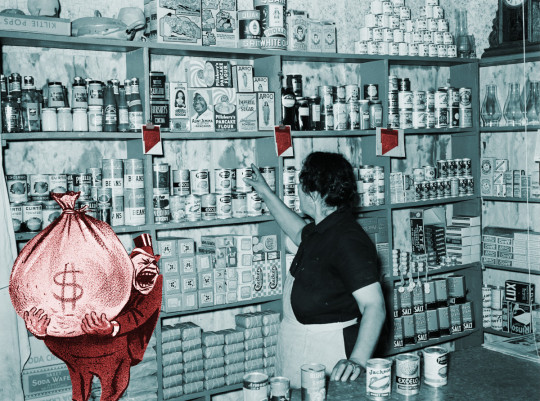
I'm coming to BURNING MAN! On TUESDAY (Aug 27) at 1PM, I'm giving a talk called "DISENSHITTIFY OR DIE!" at PALENQUE NORTE (7&E). On WEDNESDAY (Aug 28) at NOON, I'm doing a "Talking Caterpillar" Q&A at LIMINAL LABS (830&C).

Walmart didn't just happen. The rise of Walmart – and Amazon, its online successor – was the result of a specific policy choice, the decision by the Reagan administration not to enforce a key antitrust law. Walmart may have been founded by Sam Walton, but its success (and the demise of the American Main Street) are down to Reaganomics.
The law that Reagan neutered? The Robinson-Patman Act, a very boring-sounding law that makes it illegal for powerful companies (like Walmart) to demand preferential pricing from their suppliers (farmers, packaged goods makers, meat producers, etc). The idea here is straightforward. A company like Walmart is a powerful buyer (a "monopsonist" – compare with "monopolist," a powerful seller). That means that they can demand deep discounts from suppliers. Smaller stores – the mom and pop store on your Main Street – don't have the clout to demand those discounts. Worse, because those buyers are weak, the sellers – packaged goods companies, agribusiness cartels, Big Meat – can actually charge them more to make up for the losses they're taking in selling below cost to Walmart.
Reagan ordered his antitrust cops to stop enforcing Robinson-Patman, which was a huge giveaway to big business. Of course, that's not how Reagan framed it: He called Robinson-Patman a declaration of "war on low prices," because it prevented big companies from using their buying power to squeeze huge discounts. Reagan's court sorcerers/economists asserted that if Walmart could get goods at lower prices, they would sell goods at lower prices.
Which was true…up to a point. Because preferential discounting (offering better discounts to bigger customers) creates a structural advantage over smaller businesses, it meant that big box stores would eventually eliminate virtually all of their smaller competitors. That's exactly what happened: downtowns withered, suburban big boxes grew. Spending that would have formerly stayed in the community was whisked away to corporate headquarters. These corporate HQs were inevitably located in "onshore-offshore" tax haven states, meaning they were barely taxed at the state level. That left plenty of money in these big companies' coffers to spend on funny accountants who'd help them avoid federal taxes, too. That's another structural advantage the big box stores had over the mom-and-pops: not only did they get their inventory at below-cost discounts, they didn't have to pay tax on the profits, either.
MBA programs actually teach this as a strategy to pursue: they usually refer to Amazon's "flywheel" where lower prices bring in more customers which allows them to demand even lower prices:
https://www.youtube.com/watch?v=BaSwWYemLek
You might have heard about rural and inner-city "food deserts," where all the independent grocery stores have shuttered, leaving behind nothing but dollar stores? These are the direct product of the decision not to enforce Robinson-Patman. Dollar stores target working class neighborhoods with functional, beloved local grocers. They open multiple dollar stores nearby (nearly all the dollar stores you see are owned by one of two conglomerates, no matter what the sign over the door says). They price goods below cost and pay for high levels of staffing, draining business off the community grocery store until it collapses. Then, all the dollar stores except one close and the remaining store fires most of its staff (working at a dollar store is incredibly dangerous, thanks to low staffing levels that make them easy targets for armed robbers). Then, they jack up prices, selling goods in "cheater" sizes that are smaller than the normal retail packaging, and which are only made available to large dollar store conglomerates:
https://pluralistic.net/2023/03/27/walmarts-jackals/#cheater-sizes
Writing in The American Prospect, Max M Miller and Bryce Tuttle1 – a current and a former staffer for FTC Commissioner Alvaro Bedoya – write about the long shadow cast by Reagan's decision to put Robinson-Patman in mothballs:
https://prospect.org/economy/2024-08-13-stopping-excessive-market-power-monopoly/
They tell the story of Robinson-Patman's origins in 1936, when A&P was using preferential discounts to destroy the independent grocery sector and endanger the American food system. A&P didn't just demand preferential discounts from its suppliers; it also charged them a fortune to be displayed on its shelves, an early version of Amazon's $38b/year payola system:
https://pluralistic.net/2022/11/28/enshittification/#relentless-payola
They point out that Robinson-Patman didn't really need to be enacted; America already had an antitrust law that banned this conduct: section 2 of the the Clayton Act, which was passed in 1914. But for decades, the US courts refused to interpret the Clayton Act according to its plain meaning, with judges tying themselves in knots to insist that the law couldn't possibly mean what it said. Robinson-Patman was one of a series of antitrust laws that Congress passed in a bid to explain in words so small even federal judges could understand them that the purpose of American antitrust law was to keep corporations weak:
https://pluralistic.net/2023/04/14/aiming-at-dollars/#not-men
Both the Clayton Act and Robinson-Patman reject the argument that it's OK to let monopolies form and come to dominate critical sectors of the American economy based on the theoretical possibility that this will lead to lower prices. They reject this idea first as a legal matter. We don't let giant corporations victimize small businesses and their suppliers just because that might help someone else.
Beyond this, there's the realpolitik of monopoly. Yes, companies could pass lower costs on to customers, but will they? Look at Amazon: the company takes $0.45-$0.51 out of every dollar that its sellers earn, and requires them to offer their lowest price on Amazon. No one has a 45-51% margin, so every seller jacks up their prices on Amazon, but you don't notice it, because Amazon forces them to jack up prices everywhere else:
https://pluralistic.net/2024/03/01/managerial-discretion/#junk-fees
The Robinson-Patman Act did important work, and its absence led to many of the horribles we're living through today. This week on his Peoples & Things podcast, Lee Vinsel talked with Benjamin Waterhouse about his new book, One Day I’ll Work for Myself: The Dream and Delusion That Conquered America:
https://athenaeum.vt.domains/peoplesandthings/2024/08/12/78-benjamin-c-waterhouse-on-one-day-ill-work-for-myself-the-dream-and-delusion-that-conquered-america/
Towards the end of the discussion, Vinsel and Waterhouse turn to Robinson-Patman, its author, Wright Patman, and the politics of small business in America. They point out – correctly – that Wright Patman was something of a creep, a "Dixiecrat" (southern Democrat) who was either an ideological segregationist or someone who didn't mind supporting segregation irrespective of his beliefs.
That's a valid critique of Wright Patman, but it's got little bearing on the substance and history of the law that bears his name, the Robinson-Patman Act. Vinsel and Waterhouse get into that as well, and while they made some good points that I wholeheartedly agreed with, I fiercely disagree with the conclusion they drew from these points.
Vinsel and Waterhouse point out (again, correctly) that small businesses have a long history of supporting reactionary causes and attacking workers' rights – associations of small businesses, small women-owned business, and small minority-owned businesses were all in on opposition to minimum wages and other key labor causes.
But while this is all true, that doesn't make Robinson-Patman a reactionary law, or bad for workers. The point of protecting small businesses from the predatory practices of large firms is to maintain an American economy where business can't trump workers or government. Large companies are literally ungovernable: they have gigantic war-chests they can spend lobbying governments and corrupting the political process, and concentrated sectors find it comparatively easy to come together to decide on a single lobbying position and then make it reality.
As Vinsel and Waterhouse discuss, US big business has traditionally hated small business. They recount a notorious and telling anaecdote about the editor of the Chamber of Commerce magazine asking his boss if he could include coverage of small businesses, given the many small business owners who belonged to the Chamber, only to be told, "Over my dead body." Why did – why does – big business hate small business so much? Because small businesses wreck the game. If they are included in hearings, notices of inquiry, or just given a vote on what the Chamber of Commerce will lobby for with their membership dollars, they will ask for things that break with the big business lobbying consensus.
That's why we should like small business. Not because small business owners are incapable of being petty tyrants, but because whatever else, they will be petty. They won't be able to hire million-dollar-a-month union-busting law-firms, they won't be able to bribe Congress to pass favorable laws, they can't capture their regulators with juicy offers of sweet jobs after their government service ends.
Vinsel and Waterhouse point out that many large firms emerged during the era in which Robinson-Patman was in force, but that misunderstands the purpose of Robinson-Patman: it wasn't designed to prevent any large businesses from emerging. There are some capital-intensive sectors (say, chip fabrication) where the minimum size for doing anything is pretty damned big.
As Miller and Tuttle write:
The goal of RPA was not to create a permanent Jeffersonian agrarian republic of exclusively small businesses. It was to preserve a diverse economy of big and small businesses. Congress recognized that the needs of communities and people—whether in their role as consumers, business owners, or workers—are varied and diverse. A handful of large chains would never be able to meet all those needs in every community, especially if they are granted pricing power.
The fight against monopoly is only secondarily a fight between small businesses and giant ones. It's foundationally a fight about whether corporations should have so much power that they are too big to fail, too big to jail, and too big to care.

Community voting for SXSW is live! If you wanna hear RIDA QADRI and me talk about how GIG WORKERS can DISENSHITTIFY their jobs with INTEROPERABILITY, VOTE FOR THIS ONE!

If you'd like an essay-formatted version of this post to read or share, here's a link to it on pluralistic.net, my surveillance-free, ad-free, tracker-free blog:
https://pluralistic.net/2024/08/14/the-price-is-wright/#enforcement-priorities
#pluralistic#Robinson-Patman Act#ftc#alvaro bedoya#monopoly#monopsony#main street#too big to jail#too big to care#impunity#regulatory capture#prices#the american prospect#Max M Miller#Bryce Tuttle#a and p#wright patman
2K notes
·
View notes
Note
any thoughts on the new post that staff went scorched earth on which is now making the rounds abt tumblr live? it basically screenshots all the tos and claims if you've ever opened the app (or in some rbs, unsnoozed live) tumblr has gotten your data. on the one hand i feel like this is fearmongering, but on the other its true that MOST sites have your data as is so its pretty standard. you seem pretty knowledgeable abt data gathering so i was wondering abt your take
This is going to be pretty unkind but watching tumblr users interact with staff and live is a great primer on how conspiracy theories happen.
Nobody on this fucking website knows how to read a ToS, nobody on this website knows how anything fucking works (sorry, this is not a dig at you but how would tumblr "get" your data from you clicking or unclicking live; the only data that tumblr has on you is the data that you have put on tumblr what data do people think that clicking the "new" button is scooping up that is anything beyond interactions or posts or IP addresses which are the things that tumblr already has information about like you do not introduce new information into the tumblr ecosystem by clicking a button you haven't installed anything you haven't changed permissions on your browser if everyone is so goddamned scared about live stealing their data i strongly recommend they stop using anything but public internet through an anonymizer and making sure location data is shut off on all of their devices and anyone who is flipping their shit about the type of data that live is collecting but who is using chrome on any device needs to chill the fuck out about live and flip the fuck out about google)
this is like that post about twitter's content policy that circulated the other day or that post about deviantart's content policy that circulated ten fucking years ago nobody knows how to read legal documents and nobody knows how to read technical documentation and this comes together into unholy matrimony on the no reading comprehension at all moral panic website
live never violated the GDPR it was just rolled out in the US first but the entire userbase decided that because it hadn't been rolled out simultaneously in the EU and the US that it was SO UNSPEAKABLY PRIVACY VIOLATEY THAT THE EU HAD BANNED IT FOR ITS CRIMES with, like, nothing whatsoever backing that up because, again, even at its most intrusive Live collects about as much data as Twitter or Yelp, both of which are *capable* of meeting GDPR standards with that level of data collection (even if musk sometimes makes decisions that violate GDPR).
Live is significantly less intrusive than any facebook product, than Amazon, and than any Google product. If you use youtube logged in, don't worry about live, the horse is out of the barn and tumblr is the least of your worries *regardless* of live. If you regularly use Google as a search engine please god learn how to evaluate and compare risks across platforms because Live is like a coughing baby compared to about a dozen things that most highly online people interact with every single day.
If you don't want to use live don't use live. Clicking the button doesn't magically transfer your secret FBI file to tumblr and even agreeing to the ToS doesn't share anything that tumblr doesn't already have if you don't continue to interact - if you don't interact with live after agreeing to the ToS it's not collecting any data except your non-interaction.
For everyone who is losing it over Live just turn off your goddamned location on your fucking cellphone and turn off your location on your goddamned computers and that's it, you're good, you're fine, relax. If your response to "turn off your location" is "but I need it for _____" then don't worry about Live, whatever "_____" is was already collecting and selling your data.
Do you use an activity tracker? Congrats, you have much, much bigger privacy issues to worry about than tumblr live.
Okay but also I yelled about that post and the very many ways in which it was incorrect in January.
And I happened to take an archive of the page at that time because I'm a paranoid motherfucker.
And if you want my guess as to why staff went "scorched earth" on that post it's probably because if you scroll down to the bottom of the page on the archive, OP calls on everyone looking at the post to send a kind fuck you to the CEO then tagged his tumblr.
If you look at the other posts that went scorched earth in relation to tumblr staff they were also posts that very pointedly directed a lot of ire at a single staff member.
I don't think that any individual tumblr staff members are above criticism and I don't think that staff as a whole is above criticism but part of learning to read a ToS is understanding that someone can be shitty and vague and use TERF talking points and skirt the line and be technically okay under the ToS while someone can have a legitimate gripe about another user being horrible and manage to violate the ToS by accidentally spinning up a harassment campaign or suicide baiting someone.
Shitty people like nazis and terfs thrive on being edge cases. They are very good at finding a boundary and standing juuuuuuuuust on this side of it and going "la la la I'm not violating the ToS, you can't stop me!" and that blows and it leads to a lot of people encountering a lot of shitty stuff on a lot of websites but personally I'm pretty glad that there's a lot of gray area because when you cut out gray area that's when you see things like It's Going Down getting banned as extremist content alongside white supremacists. Please continue to report nazis and terfs, and when possible go deep into their pages to report because a pattern of behavior is more likely to get recognized as hate speech than a single post that gets reported a hundred times. Please block as many people who it's harmful for you to interact with as possible because it's clear that staff is not going to do the kind of work protecting users that users would like staff to do.
However I just can't get angry on behalf of a blogger who got nuked for saying "Hey everyone who hates this feature that we all hate please go tell the CEO to fuck himself at this URL specifically" - that is an extremely clear violation of the ToS because it is absolutely targeted harassment.
So now tumblr-the-userbase is going off on its merry conspiracy way skipping through fields and lacking reading comprehension and saying "users are getting banned for reporting the crimes of tumblr live and its gdpr violations" and ignoring the fact that the post was nuked because the last line was saying "hey everyone, let's all individually tell the CEO to fuck off in messages sent directly to him that are certainly not going to include any threats, exaggerations, gore, etc. etc. etc."
If I were to make a post that had 50k notes and the last line was "and while you're at it, please send tumblr-user-ms-demeanor a personalized message telling them why they're a terrible person so they know what we think of them" it would absolutely be reasonable to say that was harassing that user. And that post did it with the CEO. Who is not above criticism (and I have my criticisms! I don't think he really gets tumblr and that's a problem!), but jesus fucking christ don't tag the goddamned CEO or any other staff member in a call to action asking users to send them messages saying "fuck off" this is literally the stupidest thing I've ever seen a tumblr conspiracy theory coalesce around.
Anyway thank you for giving me a place to vent i've been getting more and more pissed about this for three days. Everyone feel free to kindly tell tumblr user ms demeanor to fuck off.
9K notes
·
View notes
Text
Not everyone likes my book, and I'm OK with that. There are many classic children's books some people just don't like because of their message or how they portray it, but I love them because they offer something a little different.

I made something straight from the heart and took a big chance on it. It caters to no one and breaks many conventions you find in children's books. I wanted adults to be able to enjoy the story as well, so it's not afraid to get a little sad. There were a few children's book bloggers I had emailed who wouldn't review it because of that reason. And there were Read Aloud YouTube channels who wouldn't make a video on it because they didn't like the ending.

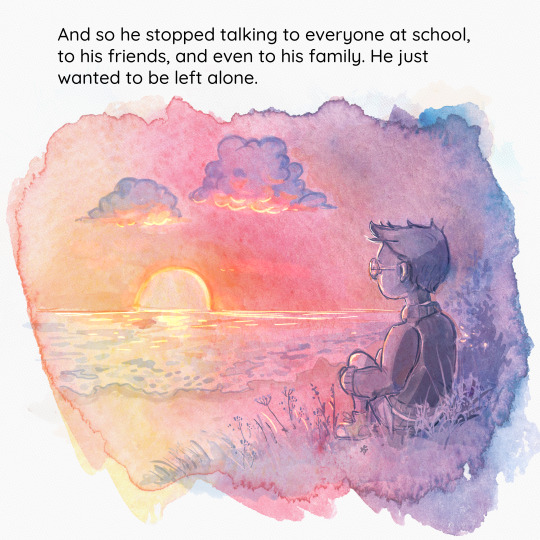
But there were also many people who absolutely loved the book. They got what I was trying to do, so I know there is an audience for this sort of thing. The more secluded you feel you are from society the better the chance you'll like it. This isn't the case for everyone but just a trend I noticed. Reviews on Amazon have been overwhelming positive, and hey, my mom liked it too. And the book has sold almost a 100 copies in its first month.

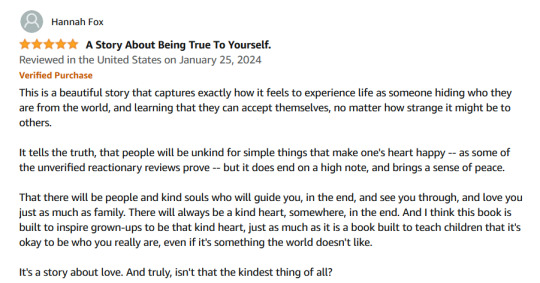
~~~~~~~~~~~~~~~~~~~~~~~~~~~~~~~~~~~~~~~~~~~~~~~~~~~~~~~~~~~~~~~
But then again, I also get these drive-by reviews from window shoppers. This is just the reality of trying to do something a bit different with a kid's book. People absolutely judge a book by it's cover.
~~~~~~~~~~~~~~~~~~~~~~~~~~~~~~~~~~~~~~~~~~~~~~~~~~~~~~~~~~~~~~~
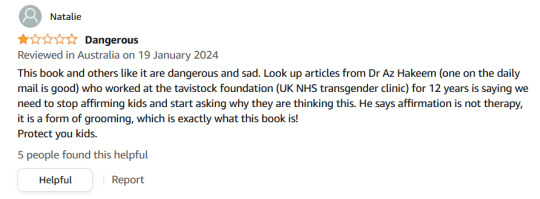

I know how to write things that are guaranteed to sell and make money, but this ain't one of them. Doing what is guaranteed to work gets boring after a couple of years. It's too safe. It's fulfilling work to make a product that people need but also empty at the same time.
This was a complete gamble. I have been publishing on Amazon for the last 8 years now, and I haven't felt this excited since I released my first book. And thinking back on it, that first book was also a bold gamble as well. And it sold very well. Maybe then, that's just the secret to success.
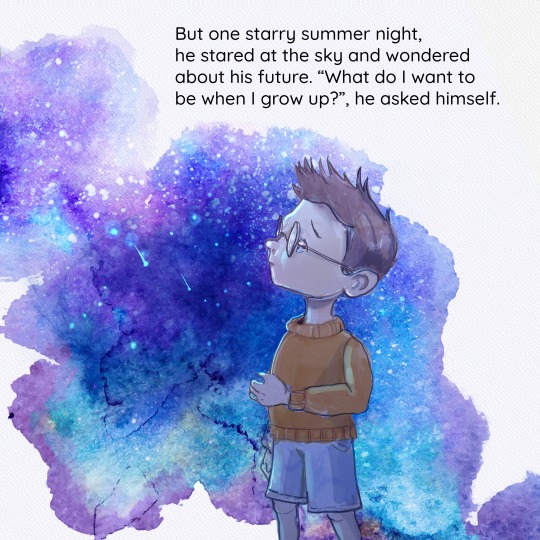

Anyways, the book is on Amazon. You can also find the full story and illustrations on YouTube for free as well. If you would like to support the book, a quick rating on Amazon or Goodreads is one of the best ways to do so.
#books#childrens books#reading#creativity#deer#furry#illustration#artists on tumblr#queer#lgbtqia#art#therian#transgender
4K notes
·
View notes
Text
How to Bring Your Product to Amazon
How to Bring Your Product to Amazon Source – www.aboutamazon.com Adding Amazon to the places companies sell products increases conversions and gets a brand in front of its target audience. Most retail businesses should at least consider whether the online shopping giant offers a good opportunity to reach new customers. How to Sell Products on Amazon In a survey of over 2,000 Amazon sellers,…

View On WordPress
0 notes
Text
26 Best Products To Sell Online In 2023 (According To Data)
winning products,dropshipping products,shopify winning products,product research,shopify products,best products to sell on amazon,products to sell on shopify,best winning products,best dropshipping products to sell,best products to sell,how to find good p
The best products to sell online: the data Below, you’ll find a list of over 25 products that sell well online as well as data from a few online marketplaces: Etsy, Amazon and eBay. These are three of the web’s most popular ecommerce platforms, and they all have built-in marketplaces. This means you are one of many sellers on the platform as opposed to selling products directly from your own…

View On WordPress
#best dropshipping products to sell#best products to sell#best products to sell on amazon#best products to sell online#best winning dropshipping products#best winning products#dropshipping products#ecommerce winning products#how to find good products to sell#product research#products to sell on shopify#shopify products#shopify winning products#top products to sell on shopify#winning product#winning products
0 notes
Text

#OtoEcomm#oto ecommerce#amazon#amazonseller#amazonfba#productresearch#how to sell product on amazon#how to sell product online#how to became online seller#amazon online course#amazon training
0 notes
Note
Hi, Neil! You've mentioned that Brian May was initially reluctant to give you permission to use Queen's music in the miniseries (because of competition with the Bohemian Rhapsody film, I think?) but I don't remember you ever telling us why he finally relented. Unless it involves a secret phrase not unlike why the sheep finally obeyed Babe the pig, how did you get him to change his mind?
He wouldn't let us use Queen when we did the BBC Radio 4 adaptation. He was concerned that people might think that Queen was being made fun of, or that Queen was being seen as something old-fashioned or something. For Good Omens the TV show I wrote him a letter, which said...
Dear Brian
Terry Pratchett and I had a private joke, back in the 80s, that any cassette in your car would eventually turn into Queen's Greatest Hits. We put the joke into our cowritten novel GOOD OMENS, and wove a certain amount of Queen magic through the book. Done because, pretty obviously, we love Queen. The book went on to sell enormous numbers over the years, and whenever two Good Omens fans got together, they would talk about Queen.
I know that when Dirk Maggs approached you when he did the Radio 4 adaptation of GOOD OMENS, you were wary about getting involved, due to concerns about, well cassettes, and the possibility of it positioning Queen in people's minds as something old fashioned or silly.
Which, I thought, when Dirk told me about it, was fair enough.
I've now spent the better part of the last four years writing scripts for, and shooting, a TV adaptation of GOOD OMENS. It stars Michael Sheen, David Tennant, Miranda Richardson, Adria Arjana, Michael McKean, Derek Jacobi, Jon Hamm, Nick Offerman, and lots of other amazing people, and it will be narrated by Frances McDormand. It is directed by Emmy-award-winning Douglas Mackinnon.
Douglas loves Queen. I love Queen. David Arnold loves Queen.
And the millions upon millions of Good Omens fans around the world love Queen too. So we have put various moments in there just for them (including a brass band playing "Lazing on a Sunday Afternoon"). We want Queen music to comment on the action.
The show will come out from Amazon, and then from the BBC, next year. This year we are in post-production.
We'd love to show you some of what we've got. We'd love to pick your brains and to get your take on what we're doing. To find out if there's a way we can include you, or just brief you on what we've planned so far.
And Brian cheerfully apologised for having said no before, and said yes.
(Queen didn't want us to use the song Bohemian Rhapsody initially, because of concerns about the movie, but after a while they were happy even with that.)
5K notes
·
View notes
Text
When I was a teenager I thought we were going to have robots everywhere, like the future was going to be the Jetsons, tiny robots and big robots that would just do everything. Most of this was not reading scifi, it was reading Hans Moravec and Ray Kurzweil.
And robots do have their place, but it's mostly as highly specialized machines doing jobs that are either highly repetitive or very bespoke but programmable. Everything else?
The dream is to have something that can replace a human, a humaniform robot that can just slot right into the spot a human once occupied, serving drinks or caring for the elderly, and I just have so much trouble taking the idea seriously now. Maybe it's because I've spent time in the software industry and have seen how errors and issues accumulate, and how many damned corner case you need to account for even if you're in a walled garden. But the idea of actually being able to get to the point where these things are fulfilling the promises made about them still seems laughable, and we're closer than we've ever been.
Last year Amazon began doing a trial of Digit, one of these vaguely human robots, and I cannot tell how much this is a stunt and how much this is actually useful and cost-effective. Knowing how companies work, there is every incentive for the robot-makers to "trial" their product in very limited capacity at very unsustainable costs, maybe even free, which is then used for "exposure" in order to hype the market and ideally get some funding to make the thing actually work, or work within costs, or give the devs and engineers some time to work out the bugs. I don't think any robot company owes me a look at their finances or the parameters of their deals, but it sure would be nice if every single article about this weren't a puff piece written exactly how I would expect both companies want it written.
And Boston Dynamics has Spot deployed, but reading their press releases makes me cringe from the corpospeak, and I'm still left questioning how much this is "real" and how much it's a gimmick meant to fund future investment. It's entirely possible I'm just a curmudgeon, but it feels like everyone has something to sell, and the market for someone saying "this is actually just non-viable at these costs" is very small.
The early 2000s optimism has turned me into such a cynic where technology is concerned. I need to go crack my copy of The Singularity is Near and see what, at 18, I thought the future was going to be like. My stance, until I actually see something that's not a carefully staged press demonstration, is that this particular bit of "the future" has more catches, costs, and problems than it wants to show the public.
169 notes
·
View notes
Text
Rating the photoshop for bird products I found on Amazon
It's a classic story: You want to sell a product for bird owners on Amazon. Your potential customers may just need some reference for how big your product is, or may need to be shown how a bird might use such an exotic item as a "perch". But you don't want to wrangle one or more birds for the sake of a product image. So you turn to photoshop.
Let's take a moment to rank some of these works of art:
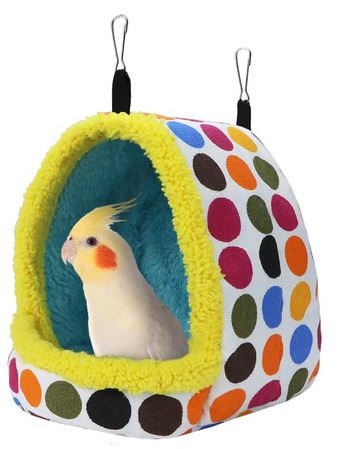
Delightful. The masking is a bit off around the crest, but I don't think it needs to be fixed. 9/10, you got the point across.
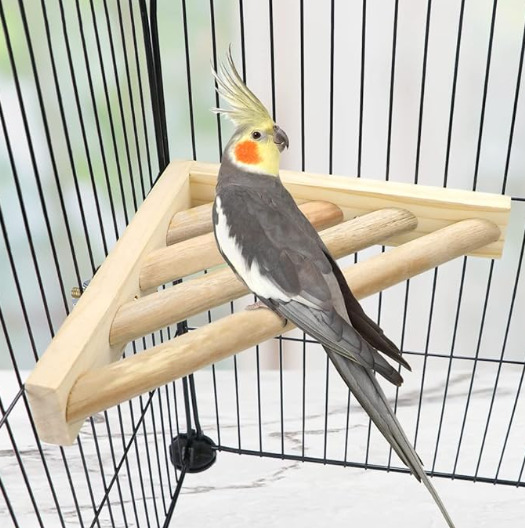
A rare example of a bird that is not lost in a white void. Based on the product description, this perch should actually be several inches smaller than a cockatiel, but as we'll see we can't get too picky about scale. 6/10, perspective could use some work.
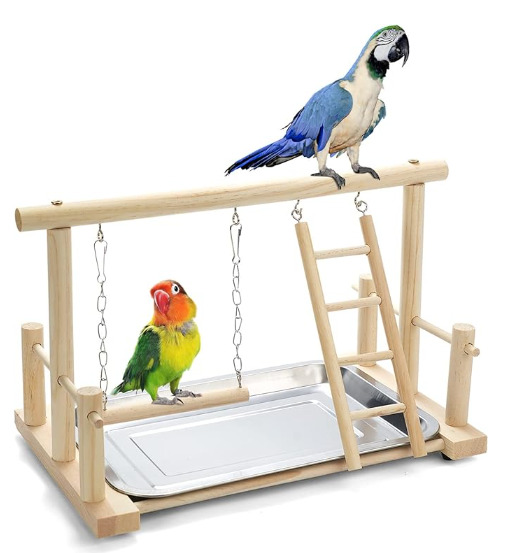
Interesting color of macaw, FASCINATING take on the relative sizes of macaws and lovebirds. 4/10, the lovebird seems to be enjoying themself but I think you're trying to pretend a macaw wouldn't toss this thing around like an overpriced foot toy.

Why doesn't the cockatiel get to play? 4/10, this makes me sad.
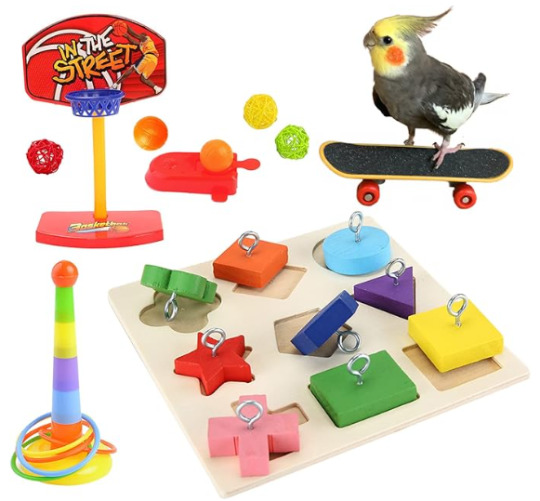
That bird might have actually been standing on that skateboard when they were sucked into the white void! Amazing! 13/10, cockatiel finally gets to play!

This toy's largest dimension is 18.5 inches. Blue-and-gold macaws are around 30–34 inches. 2/10, please the lies have to stop.
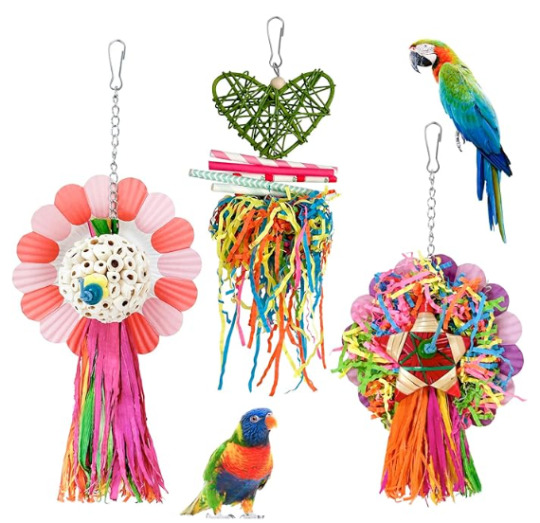
This is just a collage. It no longer feels like they're trying to tell me how big these things are; I might not know how big your wicker heart with streamers is, but I know a lorikeet is smaller than a macaw. Incredulity has stretched far enough to snap. 3/10, still pretty birds.
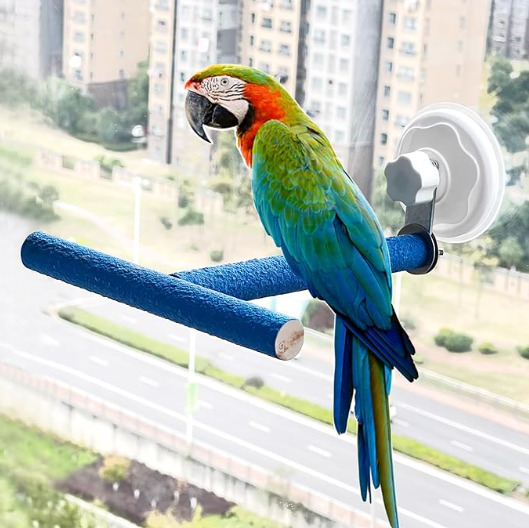
2/10, hey wait I know that macaw--

The birds and toys hang in a void. There is no suggestion that these birds were ever near these toys, but the blue parakeet has been artfully depicted as perching on one of them. I do not feel deceived, I feel informed. 10/10.

No. No. What have you done?? Did the mirror eat his face? Why did you let the mirror eat his face? Please, destroy the mirror before it comes for us all. 1/10, I swear I've seen that bird somewhere else.
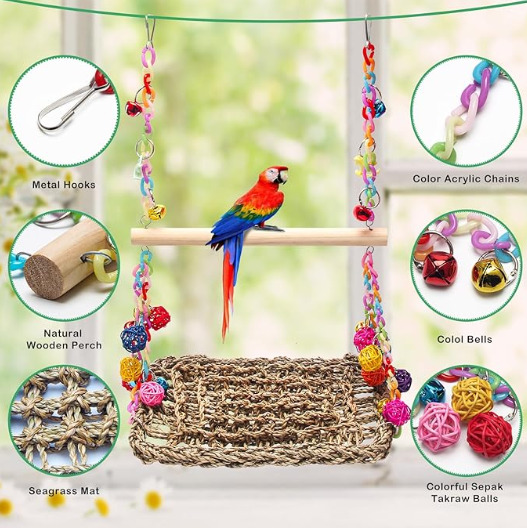
oh my fucking god
504 notes
·
View notes
Text
Hasbro is super-excited for a digital D&D future. They're tired of selling us, as Penny Arcade perfectly describes, a single hamburger we can share with our friends every week for thirty years. Hasbro wants subscription revenue from every player every month – not just the single purchase of a book you can keep, share, and use for the rest of your life. Hasbro doesn't want to sell you D&D. They want you to pay rent. Chris Cocks, Hasbro's president and former president of Wizards of the Coast, is pushing hard for a digital future. He already said they're running experiments with artificial intelligence saying "D&D has 50 years of content that we can mine". The new head of Wizards of the Coast, the subsidiary of Hasbro in charge of D&D, is a former Blizzard executive who replaced a former Amazon and Microsoft executive. They posted a new D&D product architect job with a clear focus on digital gaming and a new "monetization designer" which is as close to "professional enshittifier" as I've heard of in a job description. So yeah, Hasbro is really excited to charge monthly fees and microtransactions for D&D and ensure you never stop paying for it. But I have good news for you. It doesn't matter.
#dnd#D&D#hasbro#wizards of the coast#5e.tools is your friend#the article also recommends playing other ttrpgs 👍
183 notes
·
View notes